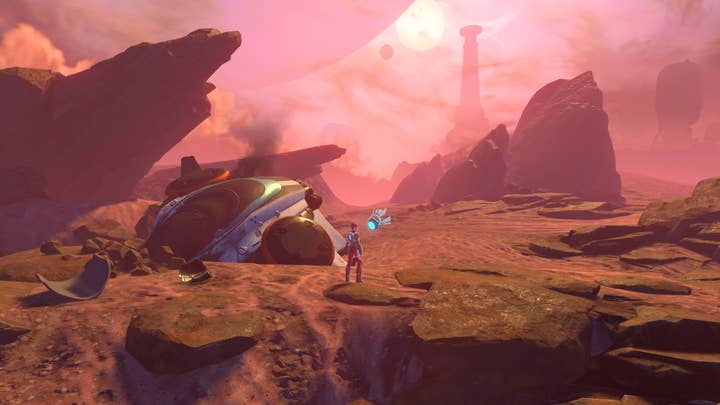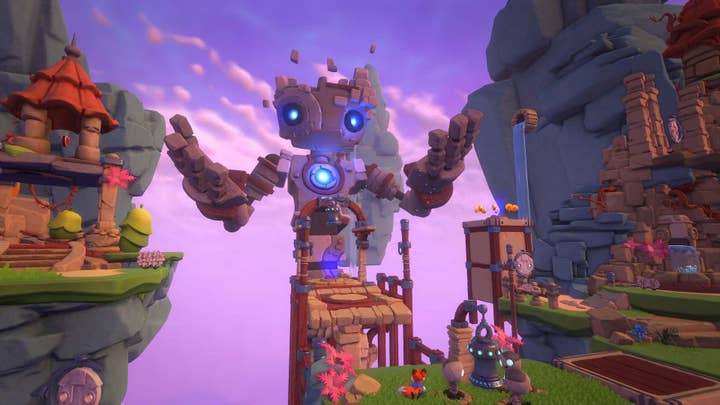Lucky's Tale dev aims to be "Disney of the next generation"
Former GameStop and PlayStation exec Mark Stanley on why he's joined Playful and how he intends to expand its IP across entertainment
Playful, the McKinney, Texas-based studio behind Lucky's Tale on Oculus Rift and Super Lucky's Tale on Xbox One X, has some pretty grand ambitions. The company has revealed that industry veteran Mark Stanley, creator of the GameTrust label for GameStop, has joined the independent developer as chief business officer to accelerate its growth not just as a games creator but as an entertainment company that can leverage its IP in any medium.
As Stanley tells me, the studio now has "a very big vision of being the Disney of the next generation." Those are obviously very bold words for a mid-size company with a handful of IP (Lucky, Creativerse, Star Child), but Stanley believes the groundwork is there to enable Playful's trajectory to take off.
Stanley met up with Playful boss Paul Bettner while he was working out a deal to publish Playful's upcoming PSVR title Star Child for the GameTrust label. With each interaction he had with Bettner and the Playful team, Stanley was "increasingly impressed by their talent."
"Paul and the team have been able to attract some pretty incredible talent from around the world into this small location in the middle of the country and I was increasingly impressed by their ability to produce a game and deliver on time, a process which can get very complicated," Stanley notes. "The time from vision to delivery can span two to three years and you can make left-hand turns and right-hand turns along the way, but being able to nail that vision consistently is a challenge, and Playful has been able to do it, and also do it for leading technologies. That's also a differentiating piece for the studio that attracted me on board."

Stanley points specifically to Playful's unique ability to leverage new platforms close to launch, whether it's Bettner's Words With Friends on iPhone, Lucky's Tale on Oculus Rift or Super Lucky's Tale on Xbox One X.
"We launched Super Lucky's Tale as a partnership with Microsoft for the launch of the Xbox One X, which was Microsoft's first foray into really building young, family friendly IP, a la Mario with Nintendo. And it was great to be able to deliver a game with the launch of that hardware," he says.
The appeal of Lucky and the reception that the title has gotten on the Xbox has emboldened Playful.
"The value of Playful is really focusing on engaging characters that are [appealing] across the generations, that are family friendly," Stanley says. "You saw from Super Lucky's Tale, it's a very family friendly title. You've even got a co-pilot mode where a parent can play with his or her child. That's a key piece. We think there is a big thirst and hunger in our market for that kind of content, because we have plenty of the other [types of content]. So that will also allow us to build characters these games can grow with."
Despite having worked with Oculus and now Microsoft on Lucky, Playful maintains the rights to its IP, and that's a key for any developer, as Stanley stresses to me.
"It allows us to also look at the IP holistically," he says, "and lay the groundwork for not only what a great game this could be across numerous platforms, but what would this IP look like across other mediums - in TV, short story content, theatrical, as a theme park, and even in books and elsewhere. That's the way we approach IP development from the beginning, which allows you to also maintain the team with a broad vision as they are developing the game and even if they're sinking into details such as game mechanics and puzzle solving or whatever it may be, they always have that broad picture as we put together a narrative or a story behind a game."
"We spend a lot of time on the game concept itself, but we also are having conversations at this napkin stage, as to how that story would flow from a perspective of a partnership with a TV production company or a theatrical opportunity"
As Playful begins to explore its transmedia options, Lucky is a bit of a "low-hanging fruit," Stanley observes, but it's just the beginning if Playful is going to achieve its mission of becoming a global entertainment powerhouse.
"We spent a lot of time with Lucky. The benefit of working with Lucky for other media at this point is we've defined that character well," Stanley says. "We defined his personality, his joy, the way he looks and walks, and even all the secondary characters in that game. So that gives us a lot to work with mentally at the core game level, but also branching out into other experiences...
"And we have another project, Star Child, that's a different type of game. It's a sci-fi based [adventure]. It skews a little bit older, but it's still adventurous, and it's still being built with that long view in place."

Stanley comments that Playful isn't about to abandon its gaming roots on its mission - projects will typically start as games first - but there is more and more overlapping talent when it comes to animation, film and games these days.
"The good thing is that there's a lot of parallels there," he notes. "We have global talents in narration and storytelling and illustrators... At the end of the day, a game is just an in-depth story. How it reflects in a game mechanic is one component of it... But the key difference is, as we sit down and we talk - we're right now working on a project that we're laying the groundwork for our next IP - the process we follow is we spend a lot of time on the game concept itself, but we also are having conversations at this napkin stage, as to how that story would flow from a perspective of a partnership with a TV production company or a theatrical opportunity.
"And could this be a storyline that could be pieced and episodic or does it have to be a one-conception experience? We're having these conversations at the napkin stage, which allows us to build storylines that can span multiple years."
As Unity's ADAM short film collection proves, game companies with the right talent and that wish to branch out don't have to look very far when it comes to technology. Today's game engines are remarkably powerful and can certainly be used to craft films or other shows. That's a possible avenue that Playful could take, Stanley acknowledges.
"You can see the thirst for IP from the initial numbers we received on Super Lucky's Tale... [That] gives me a lot more feel to know that we have a captive audience for good storytelling around the world"
"The evolution that we've experienced...has been incredible," he says. "What is it, about eight years ago, the video game industry surpassed Hollywood as far as size, market, etc? At that point, the technologies of movie making were still way more advanced than our gaming technologies, right? And, more recently...we are getting to that tipping point where game technologies will allow us to do more and faster, I think, in the form of storytelling. We use many of these engines today, and we are already exploring capabilities to be able to develop those stories across other mediums using gamer-centric technology."
As a former PlayStation executive who oversaw Latin America for Sony's games business, Stanley understands the importance of global appeal. It's something he's definitely going to bring to the table as Playful pursues new opportunities. The most successful entertainment companies are the ones who can create content that has no geographical boundaries.
"That's certainly the vision. Part of what I love to do, at the end of the day, I'm a builder, and I love to be able to build businesses from the ground up," he tells me. "I did it with PlayStation Latin America and worked with GameStop on that same concept. This new world allows me to go back to my entrepreneurial roots, which has been most of my background, and really take that solid foundation that Paul's team has built the last few years leading up to today and expand upon those and certainly, looking towards our future through a global lens, versus just what we're doing here in the US marketplace. You can also see the thirst for IP from the initial numbers we received on Super Lucky's Tale. Very impressive audience in Europe and Latin America for that IP. Bigger than we had ever expected. So that, obviously, makes me very happy, and gives me a lot more feel to know that we have a captive audience for good storytelling around the world."

He adds, "We need to keep a global point of view because there are different sensitivities across the world. I mean, we're lucky enough already to be working with Tencent on our Creativerse project, which allows us to view engagement and gameplay from a China market perspective. Many of us have brought in experiences from previous companies where we have had a global captive audience and we bring different sensitivities into Playful that allows us to maintain that global focus. At the end of the day, making sure that you have IP and story that's flexible and broad enough that it can really engage with audiences around the world [is key] but, on the flip side of that as well, there's very little borders in gaming. So gamers are very alike regardless of what country they're from. I certainly saw that in my PlayStation years and in GameStop as well, so I think that works to our favor."
Of course, Playful wouldn't be the first games company to spout proclamations of "becoming the next Disney." Rovio's messaging has been somewhat similar in the past, but Stanley doesn't see his new employer quite going down the Angry Birds path.
"They got to a tipping point where they were everywhere, down to chewing gum, you know?" he comments. "That is one example of taking an IP and really trying to go as broad as possible as quickly as possible. Not sure we're going to take that approach at any point. I think we're going to be a little bit meticulous about making sure that the quality side, regardless of what medium we touch, that we're raising the bar from the game standard, either higher or equal, across anything we do. That's tricky.
"How do we make sure that we're in that 30% of high quality content across everything we do? ...We're going to have to get picky about which projects we jump on"
"If you're talking to a production partnership on TV, just finding the right mix of production and talent that matches your vision and your quality levels is tricky in this world. A lot of folks just want to churn out content because there's the Netflix, Hulus, and Amazons of the world gobbling up whatever they can get their hands on and there is a lot of content out there. I would say that less than a third is really high quality. So how do we make sure that we're in that 30% of high quality content across everything we do? So that means we can't attack it all. We're going to have to get picky about which projects we jump on and make sure that we can attach the right focus and resources towards it."
Currently, Playful is a 65-person studio with three projects, but the plan is to double in size over the next year and to take on a fourth project. Moreover, Stanley explains, "We also are in the process of constructing and embedding what would be, call it a ninja strike team, that focuses on other projects outside of gaming, which would allow us then to take on more than one IP that's diversified beyond gaming. Right now, we're working on a number of different parallel projects to our IP, but the vision is, within the next year, we would have two or three teams, working each on a specific IP that is branching out into other channels.
"The other piece is developing the merchandise licensing function of the studio...ensuring that fans can get access to collectibles and other additional products tied to that IP through different partnerships, not only retail, but digital and for very specific limited run collectibles."
Playful has shown an ability to create captivating VR experiences, but how big a role VR will play in the company's future remains to be seen. Part of that likely depends on just how mainstream VR does or doesn't become going forward.
"Certainly it's a platform and a medium that we're already familiar with, which is great. We're not in the experimental stages with it anymore... We're going to be able to deliver any IP in VR and we don't think it's going away anytime soon," Stanley says. "I think the key to our focus will be what's next. How do we get to critical masses and broad audiences that are looking at the future? As you're developing a game, it could be a 24-month, three-year development cycle, how do we make sure we're keeping in mind where the puck will be in three years so we're delivering at the leading edge?
"One key example is streaming audiences today. What are we doing to make sure we're delivering an experience for that audience, which is growing exponentially? What is the key for us to deliver there? What are other attributes of gaming and mass audiences that are starting to trend and which ones are just trending and which ones will stick? Trying to really stay ahead of that curve is a tricky proposition, but our experience working in VR shows that we can catch on and innovate along those leading edges before others and try to be experts at it as much as possible before it becomes a broad movement."
Ultimately, that idea of "skating to where the puck will be" could be a determining factor in Playful living up to its lofty aspirations. It's an incredibly difficult thing to pull off in the games space, however, where technology and trends change so rapidly. Predictions are a fool's game.
"Every week there's a new prediction in our industry. You have to filter through probably 12 of those daily to see what's what," Stanley says. "One thing that makes it, not easy for us, but keeps us focused on it, is that at the end of the day, regardless of where the wind may blow in the industry, as far as trends, realities, and predictions, one thing that's a constant is great storytelling and great characters. Regardless of the medium by which they will be transmitted, the box by which people will use a streaming device or whatever it might be, a good story, good characters, we feel very strongly that the demand and the need for those is endless.
"So if we focus our time truly developing those, then adapting them to whatever medium is going to be at the forefront whenever it's ready is more of a technical issue versus a strategic need at that point."
